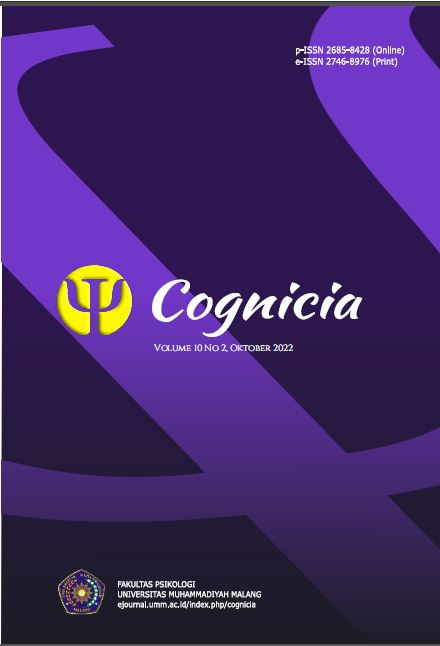Mengukur kesadaran kritis: Konstruksi skala socio-political awareness for indonesian
DOI:
https://doi.org/10.22219/cognicia.v10i2.20159Abstract
Critical awareness has recently become a widely studied topic in the intellectual, social and educational scientific community. The concept that was coined by the Brazilian critical educator is considered important because it covers a crucial aspect of consciousness that is often forgotten. Researches that seek to increase critical awareness have begun to be carried out, but they are not supported by a standardized measurement instrument. This causes the validity of the research results to be questioned. It is only in the last five years that efforts to construct critical awareness instruments have received attention. This study will construct a critical awareness scale for the Indonesian population called the Socio-Political Awareness Scale for Indonesian (SPASI). The scale refers to the concept of critical consciousness proposed by Paulo Freire and refined by modern researchers such as Watts, Diemer, and Christensen. Three aspects of critical awareness used in this scale include Social-Dominance, Critical Reflection and Socio-Political Action. The results of the analysis show that the eleven items on the SPASI scale have reliability and validity scores that meet the requirements.
Keywords: critical consciousness, Paulo Freire, scale construction
Downloads
References
Aiello, A., Pratto, F., & Pierro, A. (2013). Framing social dominance orientation and power in organizational context. Basic and Applied Social Psychology, 35(5), 487-495. https://doi.org/10.1080/01973533.2013.823614
Boateng, G. O., Neilands, T. B., Frongillo, E. A., Melgar-Quiñonez, H. R., & Young, S.
L. (2018). Best practices for developing and validating scales for health, social, and behavioral research: A primer. Frontiers in public health, 6, 149. https://doi.org/10.3389/fpubh.2018.00149
Cho, S. (2013). Critical pedagogy and social change: Critical analysis on the language of possibility. Routledge.
Diemer, M. A., & Blustein, D. L. (2006). Critical consciousness and career development among urban youth. Journal of vocational behavior, 68(2), 220-232. https://doi.org/10.1016/j.jvb.2005.07.001
Diemer, M. A., Rapa, L. J., Park, C. J., & Perry, J. C. (2016). Development and validation of the critical consciousness scale. Youth & Society, 49(4), 461-483. https://doi.org/10.1177/0044118X1453828
Freire, P. (1970). Pedagogy of the oppressed (MB Ramos, Trans.). New York: Continuum, 2007.
Gaztambide, D. (2020). From Freud to Fanon to Freire: Psychoanalysis as a liberation method. In L. Comas-Díaz & E. Torres Rivera (Eds.), Liberation psychology: Theory, method, practice, and social justice (pp. 71–90). American Psychological Association. https://doi.org/10.1037/0000198-005
Jemal, A. (2017). Critical consciousness: A critique and critical analysis of the literature. The Urban Review, 49(4), 602-626. https://doi.org/10.1007/s11256-017-0411-3
Kincheloe, J. L., McLaren, P., & Steinberg, S. R. (2011). Critical pedagogy and qualitative research. The SAGE handbook of qualitative research, 163-177.
Kteily, N., Ho, A. K., & Sidanius, J. (2012). Hierarchy in the mind: The predictive power of social dominance orientation across social contexts and domains.
Journal of Experimental Social Psychology, 48(2), 543-549. https://doi.org/10.1016/j.jesp.2011.11.007
Thomas, A., Barrie, R., Clawson, A., Brink, G., Brunner, J., & Hewitt, A. &. (2014). Assessing Critical Consciousness in Youth and Young Adults. Journal Of Research On Adolescene, 24(3), 485–496. https://doi.org/10.1111/jora.12132
Watts, R. J., & Abdul-Adil, J. K. (2018). Promoting critical consciousness in young, African-American men. In Manhood development in urban African-American communities (pp. 63-86). Routledge.
Watts, R. J., Diemer, M. A., & Voight, A. M. (2011). Critical consciousness: Current status and future directions. New directions for child and adolescent development, 2011(134), 43-57. https://doi.org/10.1002/cd.310
Downloads
Published
How to Cite
Issue
Section
License
Copyright (c) 2022 Ahmad Sulaiman, Muhammad Fath Mashuri, Sekar Larasati Lilo Sungkono, Aliyah Zahrah, Safarina Firdausi Royhana

This work is licensed under a Creative Commons Attribution-ShareAlike 4.0 International License.
Authors who publish with Jurnal Cognicia agree to the following terms:
- For all articles published in Jurnal Cognicia, copyright is retained by the authors. Authors give permission to the publisher to announce the work with conditions. When the manuscript is accepted for publication, the authors agree to automatic transfer of the publishing right to the publisher.
- Authors retain copyright and grant the journal right of first publication with the work simultaneously licensed under a Creative Commons Attribution-ShareAlike 4.0 International License that allows others to share the work with an acknowledgment of the work's authorship and initial publication in this journal.
- Authors are able to enter into separate, additional contractual arrangements for the non-exclusive distribution of the journal's published version of the work (e.g., post it to an institutional repository or publish it in a book), with an acknowledgment of its initial publication in this journal.
- Authors are permitted and encouraged to post their work online (e.g., in institutional repositories or on their website) prior to and during the submission process, as it can lead to productive exchanges, as well as earlier and greater citation of published wor (See The Effect of Open Access).

This work is licensed under a Creative Commons Attribution-ShareAlike 4.0 International License







